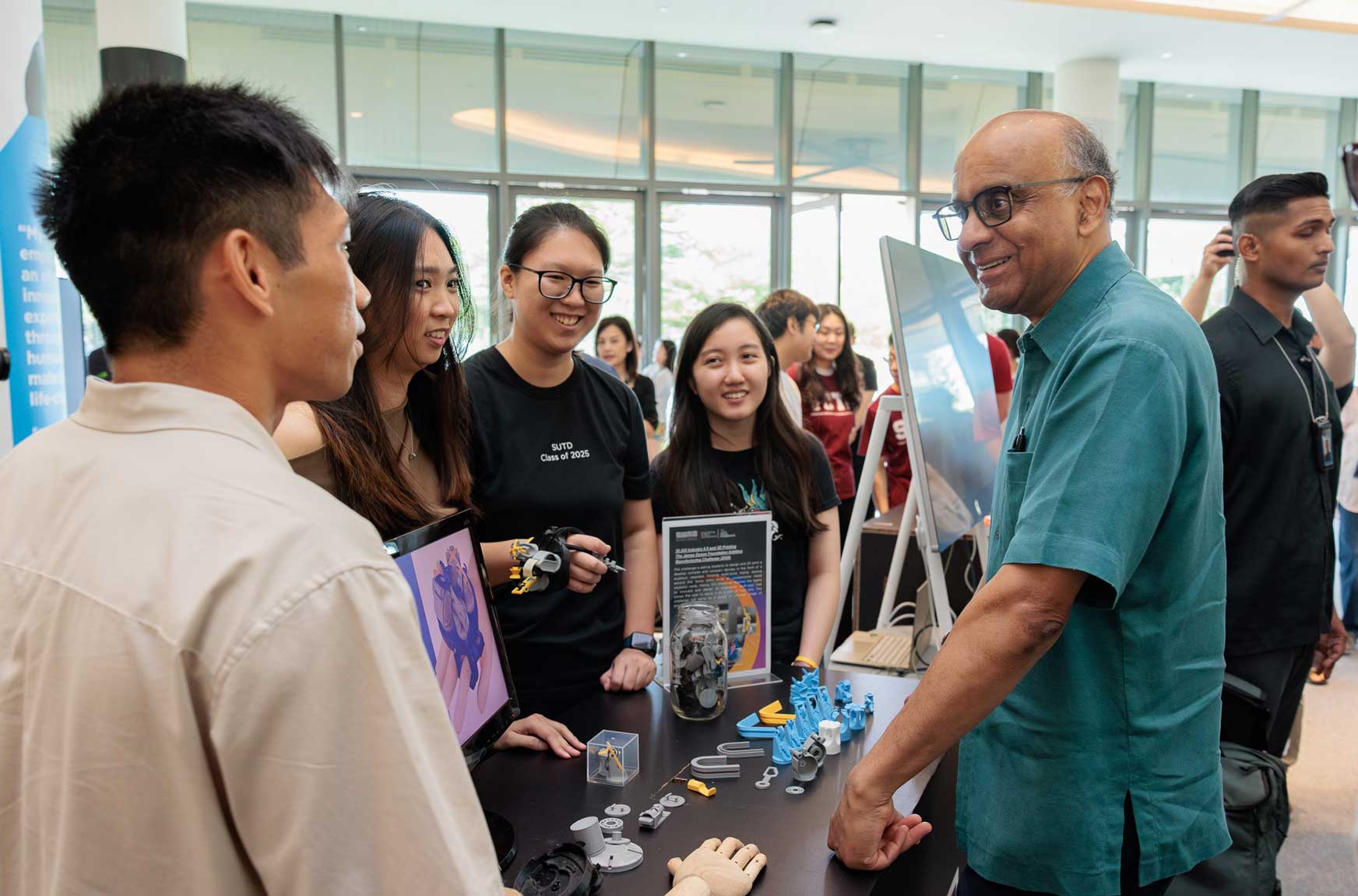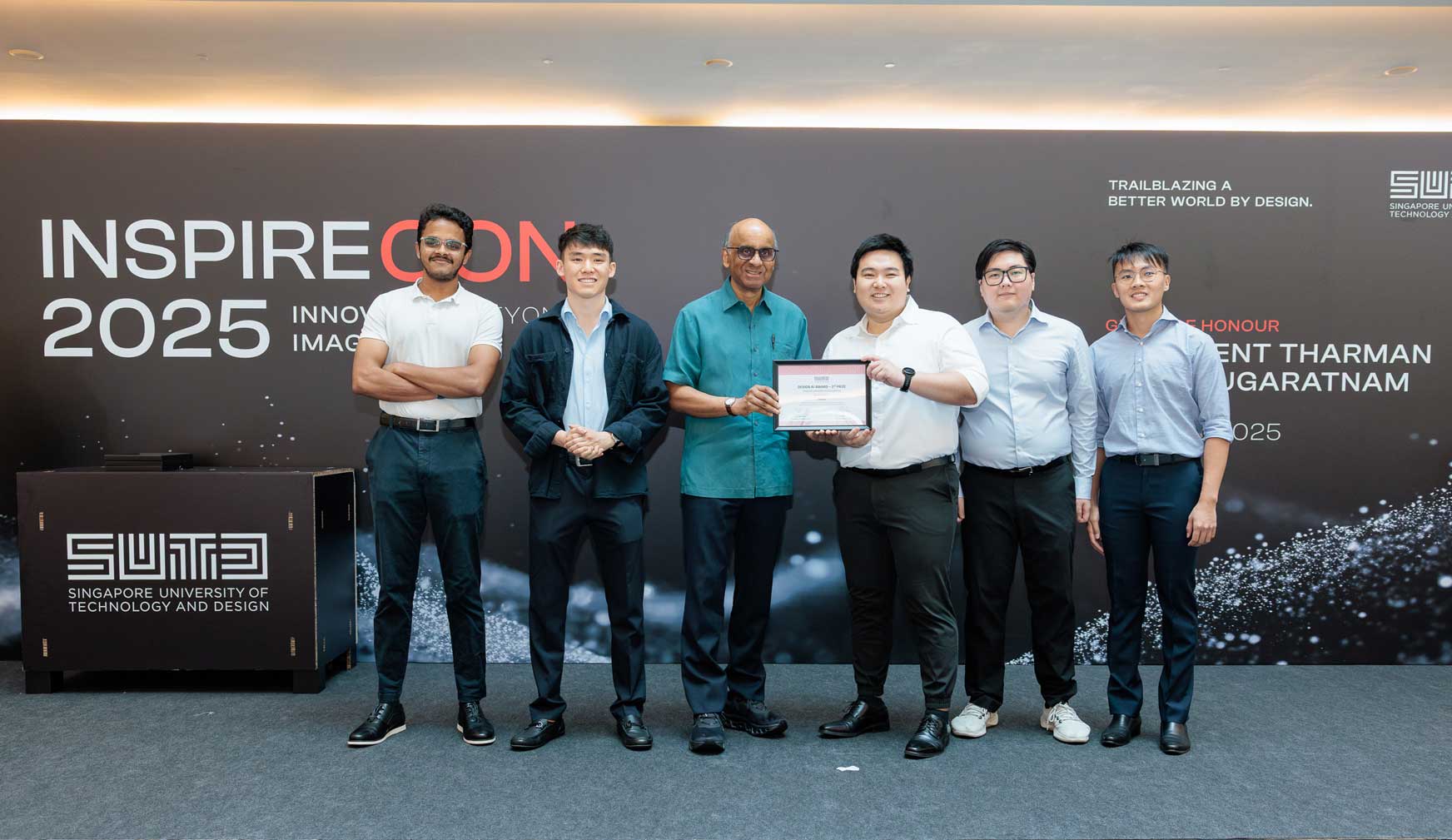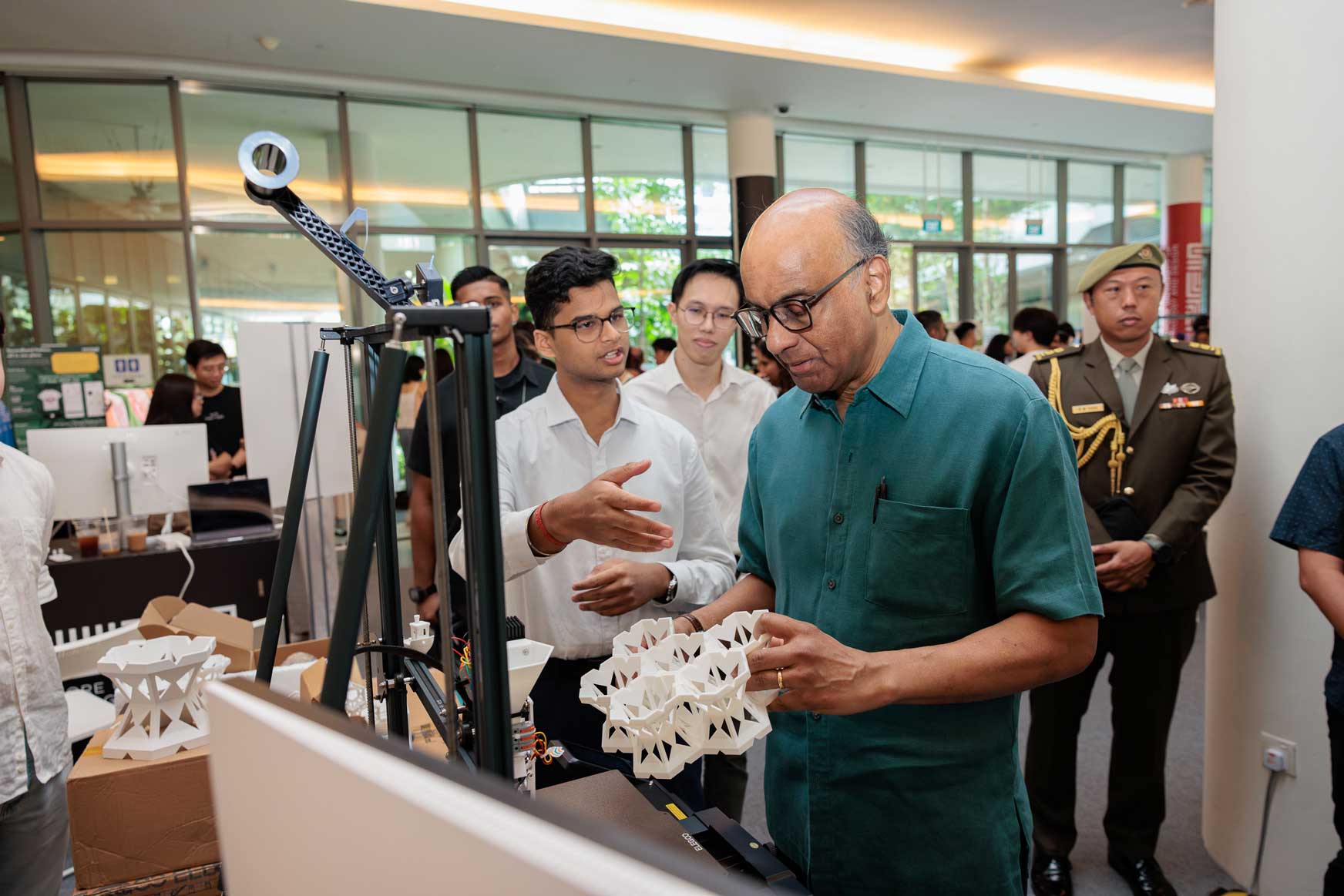SUTD Students Partner Top Firms Including L’Oreal, DB Schenker and Changi Airport Group in First InspireCon Showcase
SUTD Students Partner Top Firms Including L’Oreal, DB Schenker and Changi Airport Group in First InspireCon Showcase
Close to 90 innovations, including a joint project with L’Oreal that reimagines perfume exploration with artificial intelligence (AI) as well as one with Tan Tock Seng Hospital (TTSH) that leverages gameplay engine avatars, conversational AI and actionable feedback to help healthcare professionals develop a more emphatic communication style, were on display today at the Singapore University of Technology and Design (SUTD).
The mega innovation showcase, InspireCon 2025, brought together SUTD’s Capstone (final year student projects), Baby Shark Fund and Engineering Product Development (EPD) projects for the very first time. Visitors were able to experience firsthand how SUTD students work with design, AI and technology to solve real-world challenges in a broad spectrum of industries including beauty and personal care, defence, healthcare, transport, and social services.

President Tharman Shanmugaratnam engaging with students at InspireCon 2025.
A total of six awards were handed out at the event – three in the field of Design AI and another three in Sustainability1. President Tharman Shanmugaratnam, who is also SUTD Chancellor, was on hand to present the certificates.
In first place for the Design AI category was Fitback, an AI-powered size recommendation plugin for online apparel businesses. It stood out with its technically rigorous, AI powered-sizing solution for fashion e-commerce. By leveraging computer vision technology, it accurately extracts body measurements and maps them to retailer-specific size charts, reducing extra costs associated with customer returns. The solution also featured deep human-AI collaboration such as iterative model refinement, real-time pose correction, and user guidance features that ensured practical usability. The scalable Shopify integration and alignment to sustainability goals made Fitback a standout winner – so much so that they are now exploring commercial opportunities and have reached out to a few Shopify sellers.

President Tharman Shanmugaratnam presenting the top prize in the Design AI category to Fitback — an AI-powered size recommendation plugin for online apparel businesses.
On creating Fitback, Michael Pang, a Computer Science and Design (CSD) student said: “Working on Fitback was an eye-opening experience for my teammates and me. We are happy with how we were able to blend human insight with AI capabilities to refine our model and prioritise the user experience. Every step felt like a collaborative effort between us and AI. Knowing how Fitback can drive both business value and positive social impact is something I’ll carry with me long after this project is completed.”
In second place was EmpathIQ, which has been developed with TTSH. It uses AI to assess patient communication. The tool provides real-time feedback on tone, empathy, and non-verbal cues, empowering medical professionals to refine their interactions with patients. The team’s mentor, Assistant Professor Chow Minyang, Consultant, Department of General Medicine, TTSH, said: “EmpathIQ harnesses the power of generative AI to make clinical communication training scalable and effective. By enabling learners to practise difficult conversations – such as delivering bad news or admitting to mistakes – and receive AI-generated feedback, it empowers future clinicians to develop empathy and confidence when facing real-life patients and their next-of-kin. Collaborating with students from SUTD on this project has been truly inspiring. While my role is to guide them in coming up with an end-product, they injected fresh and innovative approaches that exceeded everyone’s expectations. Working with these students reminded me to stay adaptable, curious, and open to learning – even as a mentor.”
Tying in third place were AUROMA and GRIP-X: Adaptive Gripper for Manipulation (GRIP-X). AUROMA, which was created in collaboration with world leader in beauty, L’Oréal, seeks to redefine the fragrance discovery digital experience. Leveraging AI, AUROMA matches users to fragrance recommendations and user reviews for a more personalised and engaging way for users to find their signature scents. Vannara Lim, a final-year CSD student, explained: “We use a combination of pretrained and unsupervised models to deliver recommendations. Our project also interfaces with Large Language Models (LLMs) to parse user freeform text and image, as well as aid in our data processing and consolidation. LLM batch prediction was employed where possible to minimise our compute footprint while maximising efficiency. This approach is unique in the fragrance market today.”
GRIP-X, on the other hand, is an AI-powered robotic sorting and labelling solution that can precisely identify and photograph items, as well as automatically generate labels using OpenAI application programming interface (API). The custom gripper can handle objects of varying shapes and surfaces up to 20cm wide, before sorting them by size – demonstrating the seamless integration of robotics and AI in the digitisation of physical collections. GRIP-X was such a standout that it not only won third prize in the Design AI category, but it also snared the second prize winner in the Sustainability category. From virtual prototyping to reduce material waste, creating modular and reusable designs for scalability, to using recycled materials and borrowed equipment, the GRIP-X team was able to achieve over $1,000 in cost savings, setting a benchmark for sustainable automation in logistics and manufacturing.
The top prize in the Sustainability category went to Waste to Worth, which tackles plastic waste by converting low-density polyethylene (LDPE) waste into reusable, 3D-printed logistics tools, potentially replacing single-use Styrofoam and cardboard. This initiative pilots a circular economy model within DB Schenker’s Red Lion Air Freight warehouse, with the aim of driving sustainability in the supply chain.

Capstone Project Sustainability Winner – Waste to Worth – explaining to President Tharman Shanmugaratnam how single-use plastics are recycled into customised logistics equipment and sustainable packaging alternatives.
Describing the exhibits as “inspiring”, SUTD President, Professor Phoon Kok Kwang, said: “InspireCon 2025 marks a bold evolution from our Capstone Showcase, which features solutions that have been developed by our final-year students working in interdisciplinary teams, and in collaboration with industry partners to solve real-world problems. Speaking with students like Michael from Team Fitback and Vannara from Team AUROMA is a powerful reminder of the creativity and innovation our students possess. I am especially proud of their tenacity and unwavering spirit, having persevered and overcome various challenges to develop solutions that are not only functional, but also practical and elegantly designed. This is the true power of Design AI!”
1 The Design AI Award recognises projects that have seamlessly blended design thinking and AI into the technical implementation, human and AI collaboration as well as the ethics and responsibility aspects of their projects, while the Sustainability Award recognises Capstone project teams that have successfully promoted the United Nations Sustainable Development Goals (UN SDG) and demonstrated sustainable behaviour throughout the life cycle of their projects.
